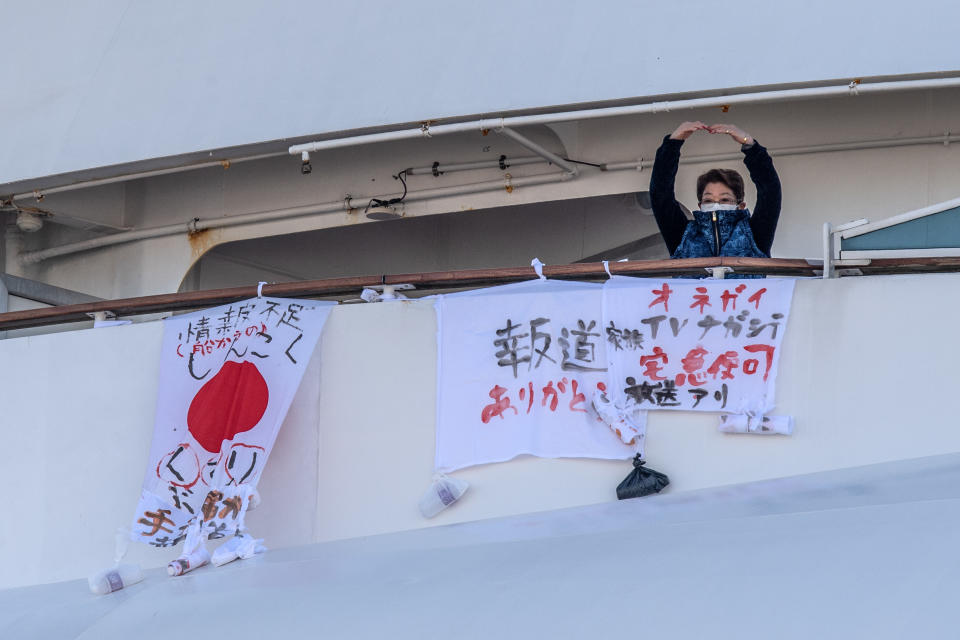'We're all free now!': Coronavirus evacuee opens up about life on Air Force base as quarantine is lifted
This week has been a welcome homecoming for 195 people evacuated from Wuhan, China, who had spent the past two weeks in quarantine in Riverside, Calif., being tested for the novel coronavirus (now officially named COVID-19) under the order of the Centers for Disease Control and Prevention (CDC).
The Riverside County public health officer announced on Monday that no one in the group — many of whom work for the U.S. State Department or are related to someone who does — had tested positive for the virus and that as of Tuesday, they were free to leave the March Air Reserve Base, where they had been quarantined since Jan. 29.
Some of the 195 guests toss their face masks in celebration as they prepare to depart March Air Reserve Base. #rivconow #ruhealth #coronavirus pic.twitter.com/vrMIZTa1ez
— Dr. Cameron Kaiser (@RivCoDoc) February 11, 2020
One of the evacuees sent a thrilled selfie video to Yahoo Lifestyle as he made his way out the door. “Today is the last day, we’re heading home,” Jarred Evans, a 27-year-old quarterback for the Chinese National Football League's Wuhan Berserkers said, adding, “We’re all free now! We’ve graduated.” He then thanked the CDC and state officials for “doing an amazing job.”
Days earlier, Evans had told Yahoo Lifestyle, “My heart [is] in Wuhan. I felt grief to leave my friends who are stuck behind. The city is in complete lockdown.”
Evans says that life under quarantine was routine — each day, he woke up in his private bedroom at 5 a.m. and ran three miles around the base. Then, he ate breakfast (eggs, sausage and muffins) at an outdoor station. He filled the rest of his time on social media, doing push-ups or sit-ups, giving interviews to media outlets, and communicating with his parents, who live in North Carolina and Florida. At night, Evans read a book borrowed from a supply tent filled with donated literature, medicine, snacks and toiletries.

“When we arrived, we had our blood tested and our nose and mouth swabbed,” Evans tells Yahoo Lifestyle. “Twice a day, we had our temperatures taken.” Describing the evacuees as being in “good spirits,” Evans says people regularly sunbathed, played with their children and got to know one another under the odd circumstances.
“We had a Super Bowl party with beer, chips and salsa and wings. Whatever you need, the staff got for you,” he says, lightheartedly comparing the accommodations to a hotel. “I would give it 3.5 stars.”
Not everyone under quarantine has had the same experience, however, with many stuck at sea — like the more than 2,000 passengers aboard the Diamond Princess, 135 of which have tested positive for the coronavirus as of Monday. From where the vessel is docked, in Yokohama, Japan, passenger David Abel has been vlogging on Facebook, where he’s shared that internet connections, meal deliveries — and morale — have run thin.

“First meal in 18 hours,” David, who is reportedly on board with his wife, Sally, posted on Feb. 4 with a photo of his fruit-and-yogurt breakfast. “Being diabetic and dairy intolerant, there is nothing here I can eat. They have since brought me 4 bread rolls & butter.”
The 74-year-old, who did not respond to Yahoo Lifestyle’s request for comment, told the Washington Post, “We’ve got two weeks’ extra cruise, albeit a confined cruise. You’ve got to make the best of the situation, haven’t you? But I’m sure that in 10 or 12 days’ time, I’ll be pulling my hair out.”
In a recent video, the Abels, who have maintained a remarkably positive attitude, shared that smokers without cigarettes are struggling with nicotine withdrawal (although, they say, cessation gum and patches were provided), meals are carb-heavy, and strong air-conditioning has caused coughing. “It’s not the virus,” said David.
David sympathizes with passengers in cabins without windows or balconies. “Can you imagine? It would be liked being locked in a wardrobe, wouldn’t it?” he told the Post. “No fresh air. No natural light. It really must be a living hell for them.” He also remarked to CNBC, “All of the luxury of having someone — a steward coming to the cabin, make the bed, put chocolate on the pillow, change the towels, face cloths, clean the bathroom — those days are gone. It just ain’t happening.”
Diamond Princess passenger Matthew Smith also told the Washington Post, "The only thing now is not to think about how much time remains," he said. "You just kind of take it day by day, moment by moment, and that's not so bad."
This is the only plea for help I have onboard #DiamondPrincess Sorry/Not sorry pic.twitter.com/FTy6lmIEZH
— Matthew Smith (@mjswhitebread) February 7, 2020
You'll all be glad to know that we have been supplied with face masks for any occasion. In-cabin formal night anyone? pic.twitter.com/4tCbwXegOD
— Matthew Smith (@mjswhitebread) February 10, 2020
In contrast to fictional depictions of quarantines — a 2008 film called Quarantine, for example, depicted characters trapped inside a building to escape a virus that causes people to kill — real-life conditions can be routine.
“We quarantine all the time — children with lice stay home from school and people with the flu don’t go to work,” Michelle Barron, MD, medical director of infection prevention and control at UCHealth University of Colorado Hospital, tells Yahoo Lifestyle. “But it seems draconian when it’s government-mandated.”
A “quarantine” is the process of confining people exposed to a disease, versus “isolation” for those actively infected, Robert Kim-Farley, MD, professor-in-residence in the Epidemiology and Community Health Science departments at the UCLA Fielding School of Public Health, tells Yahoo Lifestyle. He adds that 14-day quarantines are issued during a disease’s incubation period (the time between when a person is infected and when symptoms appear).
And determined by the illness, quarantines require three different precautionary measures. “We take airborne precautions when a disease is transmitted through the air — measles, tuberculosis or potentially ebola are examples,” says Barron. Then, a person stays inside a “negative pressure isolation room” with a filtration system that sucks air out and pumps in fresh air. “It’s like cleaning the air,” says Barron.
Droplet precautions apply when the disease spreads, for example, through coughing or sneezing on a surface. According to the CDC, “It’s currently unclear if a person can get 2019-nCoV by touching a surface or object that has the virus on it and then touching their own mouth, nose, or possibly their eyes.”
From the desk of Dr. Cameron Kaiser: An open letter to the community https://t.co/yOG2MjPcMy #coronavirus #ruhealth #rivconow pic.twitter.com/jbetlWDqCt
— Dr. Cameron Kaiser (@RivCoDoc) February 10, 2020
And contact measures are taken when the disease can spread through touching. In January, the CDC confirmed the first case of the novel coronavirus spreading person-to-person, involving a person who shared a home with an infected patient.
Kim-Farley adds that people in Wuhan are under their own quarantine, known as “cordon sanitaire,” while, in January, Chinese officials closed transportation both around and out of the city. “We haven’t seen this applied to public health since the Middle Ages,” he tells Yahoo Lifestyle.
Read more from Yahoo Lifestyle:
The flu has killed 10,000 Americans as the world worries over coronavirus
What is a pandemic and will coronavirus become one? Experts weigh in
Want daily pop culture news delivered to your inbox? Sign up here for Yahoo Entertainment & Lifestyle's newsletter.
